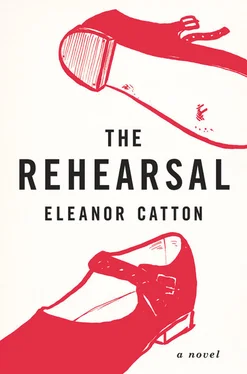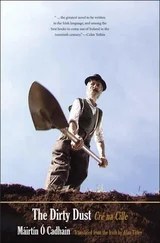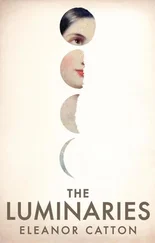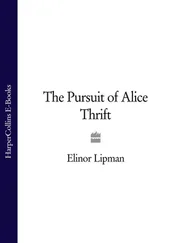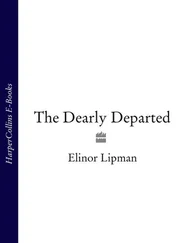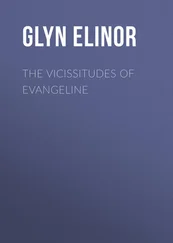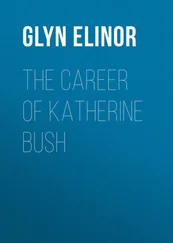“Absolutely I am.”
“Because I rang up the insurance companies,” Stanley says. “I rang up a few. I asked them about your idea to make a million, and it won’t work.”
“Of course it won’t work. I was just having a tease, and shame on you for following through, by the way,” Stanley’s father says. “But this —”
He laughs and spreads out his arms. Above the double doors of the foyer an enormous glossy banner, Opening Night! , snaps in the wind and strains fatly convex against the roped eyelets fixed along the balcony rail. Posters showing a girl in a school uniform coyly sliding a playing card into the pocket of her dress are taped to both doors of the foyer.
“This is brilliant,” Stanley’s father says. “And it’s hilarious. But I’ll be surprised if you last a week in performance. They’ll shut you down tomorrow night probably.”
“That might not be such a bad thing,” Stanley says.
“Are you in trouble?”
“Yes.”
“Need some help?” his father says, for once not using his therapy manner, but instead peering at Stanley with a curious half-smile, as if he is very proud.
“Yes,” Stanley says, more quietly. “I’ve been accused of something.”
“Excellent,” his father says. “You can tell me over dinner. Let’s get Chinese.”
October
“In your organizer,” Isolde says, “your black organizer with the gold stripe, I found an article snipped out of the front page of the newspaper. The headline read Teacher Denies Sex With Student . Only it wasn’t just the article, it was a photocopy of the article, a photocopy of a photocopy, with key phrases highlighted in yellow, maybe by you.”
Stanley is sitting a little way off, his head in his hands.
“Half of the article was familiar to me,” Isolde says, “the half that had clung to the folded spine of the newspaper when my mum swooped down and tried to rip off the front page, when she said Vultures, Vultures, and she crushed the torn piece into a ball. After she left the room I read the left-behind slice with the headline Teacher Sex and all the words disjointed and coming apart from each other, and piece by piece I tried to put it back together, the sharp-edged fragments of my sister’s love.”
Stanley is unmoving, clutching his temples in his hands and squatting like a boxer resigned to lose the fight.
“So I read the article,” Isolde is saying, “photocopied and whole, with the key phrases highlighted, phrases like Received Special Tuition, and Temporarily Removed From School. I wondered why it was in your organizer, slipped inside with your bus pass and your library receipts and your favorite sonnets written by hand. I decided it was probably an exercise you were doing at school, just an exercise, something about scandal in the news.”
In a sudden fluid motion Isolde draws herself up and pulls her elbows in to her sides.
“But now ,” she says, “now I know what really happened. I know now that you saw an opportunity in me. I know now that I am a pawn, a shining pawn advancing all the way to the furry cardboard nether-edge of the playing board to be transformed into a queen—a queen for you, a queen for your performance and your production and your career. I know now that something in me betrayed her after all, some small streak of sameness or familiarity that made you see her when I turned my head and bit my lip and tucked my hair back, and all at once you saw all the things in me that you could use. I know that you thought to yourself, Her proximity to her sister counts for a great deal.”
Isolde draws herself up tighter, as if she is gathering in all the threads of herself, all the fraying pieces, wadding herself up in order to be able to continue. When she speaks her voice is half-stifled with a kind of muted hurt that makes Stanley throb and look away.
“I am serving a double purpose for you,” Isolde says. “That kind of unknowing doubleness that halves me down the middle and carves me into two: a benefit and a use. You want to harness my proximity, squeeze me dry, hoard up all the little stained-glass splintered facts about Victoria that make up everything I know. You want the complete story, for yourself. You want my sister, but you don’t want her whole: you want her shadow, her reflection, her image that bleeds out into the newsprint on the front page. You want the air around her and the spaces she moves through and the things that brush her as she passes by. And that’s why you want me.”
“Isolde,” Stanley says in a low voice that is muffled by his hands. “You aren’t being used. Nothing about you has been used, or used up.”
“But I have used you,” Isolde says, trumping him, her voice ringing out clear and bright. “Just as you have used me, I have used you. That’s what I came here to say. You’re a kind of protection for me, that’s all. You’re a kind of proof.”
Saturday
“Before we close I’d like to say one final thing,” the saxophone teacher says, after the last girl has tripped offstage and returned to her seat on the floor. The sax teacher looks small against the wasteland of the stage. Behind her the Steinway grand is sheathed like a vast canvas-covered tombstone fallen backward and left to lie.
“I’d like to pay a tribute to one of my students,” the saxophone teacher says, “a lank and wilted student who died this year, hit by a car on her bicycle as she was coming home from the late shift at work.”
The room is deathly quiet at once.
“For a long time I have tried without success to see Bridget’s death as a tragedy,” the saxophone teacher says. “Finally I believe I can see it in that way.”
She looks down at the floor to gather her thoughts.
“When Bridget arrived at jazz band on Wednesday,” she says, “the Wednesday next that never was, the Wednesday she never saw, she would have been a celebrity. Pale and stringy Bridget, always the girl of small information and small ideas, always the girl shadowing her righteous flat-soled stalking mother, always the girl a few seconds behind the joke, would have found herself armed with something to offer and something to say. She would have been surrounded and petted and prodded as she relived her brief six minutes of conversation with Mr. Saladin at the video store for everyone to hear. Everyone would have listened. The room would have been utterly still. And she would have been warmed by the first narrow shaft of lighted pleasure she had ever really known. She would have been popular, for an instant, because she would have had real information for the first time in her short unhappy life. Bridget was robbed of this small pleasure. It is for this reason that we can see her death as tragic.”
The mothers are nodding.
“Poor Bridget,” the saxophone teacher says softly. “It is a cruel thing.”
November
Julia and Victoria are among a drowsy handful of seventh formers sitting in the common room, all of them unfurled and limp in the lapping heat of almost-summer. The lease of their high school years has all but expired, and it is with a fond kind of nostalgia that they look around them at the world that they will so soon leave behind. Through the window comes the sound of laughter and shouting from the girls on the playing field.
Gradually the common room empties, one by one, until the door clatters shut behind the last of them and only Julia and Victoria remain. Julia is bent over her end-of-year clearance form, and Victoria watches her for a moment from across the room.
“Did you have a thing with my sister?” Victoria says suddenly. Her voice is thin. “Earlier this year. Did you two like hook up or something?”
Читать дальше
